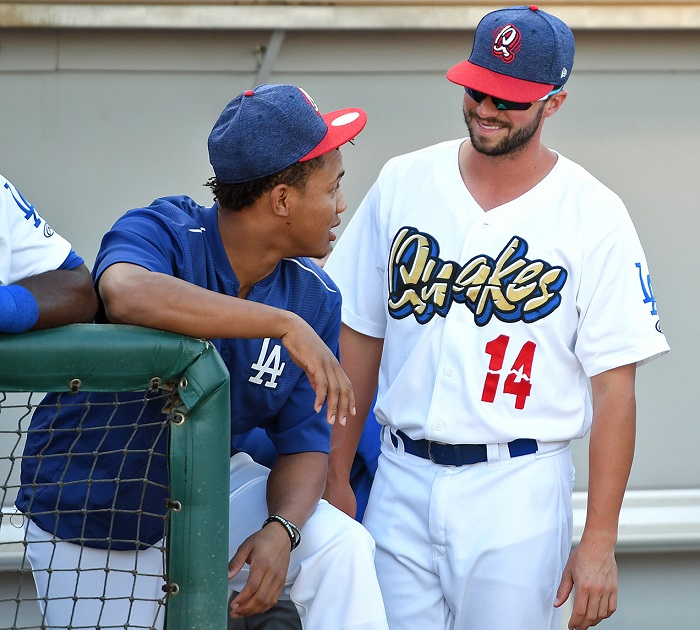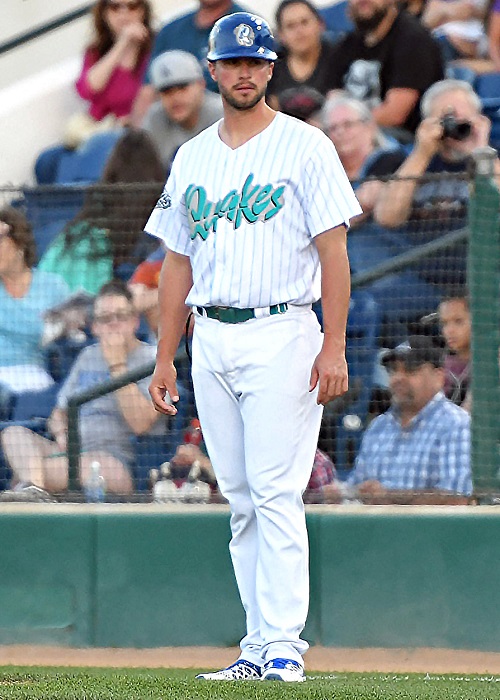The game of baseball has captivated millions of people around the globe and especially in North America. Many of us are held hostage by the game even though we are far removed from the actual playing field.
Even from a distance, we sometimes get close-up moments that are unusual and sometimes unexpected but always relished and revisited in our minds as treasured memories.
Even from the far east coast of Canada, I have had some of those moments. I spoke with Duke Snider and Tommy Lasorda by phone in the mid-eighties when the Dodgers carried on their spring training activities at renowned Dodgertown in Vero Beach, Florida. In the ensuing years, with my family, we visited Dodgertown and Dodger Stadium. During spring training in 2013, I visited Camelback Ranch, without my family, and spent a week with ThinkBlueLA friends from across the continent.
Recently, I have been in contact by email with Peter Summerville, who is a 25-year-old coach with the Rancho Cucamonga Quakes, the Dodgers High-A affiliate of the California League. For me, this is one of those moments that is most unexpected and will be filed away as a treasured moment. From Lunenburg, Nova Scotia in Canada, this contact – for a moment – has put me on LoanMart Field in faraway Rancho Cucamonga.
Summerville first appeared on the Dodgers radar in August of 2016 when he was signed as a free agent and assigned to the Rancho Cucamonga Quakes. His signing was not a surprise in that the Dodgers are very prone to signing catchers that have not been drafted or released by minor league teams. Summerville was in the not drafted class.

In his role as Performance Science Coach, Summerville has earned the respect and friendship of every member of the Quakes team and coaching staff.
(Photo credit – Steve Saenz)
Born in Seattle, Washington, Summerville attended Seattle Academy of Art and Science for academics, but played baseball for Garfield High School in Seattle. While at Seattle Academy, he was on the High Honor Roll or All A’s Honor Roll every trimester. He achieved his community service requirement of 160 hours for Seattle Academy by his sophomore year.
Following graduation from high school, the 6’2”/195-pound Summerville played four years with Santa Clara University. As mentioned, he was not drafted and here is the interesting part. He had not played baseball for over a year, yet he was signed by the Dodgers and assigned to the Rancho Cucamonga Quakes.
During his brief hiatus from competitive baseball, Summerville’s year was not a lost year but was more than productive as he was fortunate to be able to put his college major to work while feeding his love of baseball. He is most appreciative of that year as it has helped shape his future and offer him suitable career options.
“At Santa Clara, I was a Finance Major and as I got closer to graduation there was an opening to work at a baseball facility in Los Angeles. That experience was very important for my personal development, as I was able to balance both the baseball aspect, but also learn the ins and outs of running a business. However, now one hundred percent of my energy and focus is with the Dodgers Organization.”
Certainly, when Peter Summerville was signed by the Dodgers, it seemed he might have been recruited to begin a coaching career although he initially was signed as a backup and bullpen catcher. I asked him if he signed with the intention of resuming a career on the field or if he was aware that the Dodgers might be recruiting him as a coach?
“Even though I had been out of playing in competitive games for a little over a year, I was constantly around the game, whether it was catching my brothers bullpens, teaching an occasional lesson, or coaching a practice. I was ready for whatever the organization asked me to do. At that point in the season, the Quakes were in the middle of a playoff push and I really just wanted to support the coaching staff and pitchers as best as I could by being the backup bullpen catcher. I never had any thoughts about coaching, I just saw my role as an extension of the coaching staff to best support the team as we made our playoff run.”
Summerville went on to explain the significance of the work of a bullpen catcher, work that may well go unnoticed and perhaps is not appreciated by the fan sitting in the stands.
“Being a bullpen catcher is definitely one of the most exciting parts of my day and I take it very seriously, as the position can go unnoticed to the average fan. Prior to going into competition, each pitcher prepares slightly differently and you want to do your best and support him with that routine or process.”
Along with his work as bullpen catcher with the Quakes, Summerville also serves as first base coach when assigned to that role by his manager. I asked him if he saw that as a possible stepping stone to a future coaching or managerial career while wondering if he had aspirations to one day coach or manage at a higher level, perhaps even at the MLB level.
“[Quakes manager] Drew Saylor has continued to provide me with many new opportunities and experiences during my first full season. One of those is being able to coach some at first base. To be honest, I really try not to look far ahead in terms of a potential coaching or managerial career. Each day when I have the opportunity to coach first base, I do my best to provide accurate and helpful information to our players in order for us to gain an extra 90 feet and ideally score a run. By focusing on each game and doing whatever is needed to best support our players, the rest will take care of itself.”

Summerville embraces the opportunity to coach first base whenever needed. (Photo credit – Steve Saenz)
Besides his work as a bullpen catcher and first base coach, Summerville is listed as a ‘Performance Science Coach.’ For most of us the title is new to our baseball vocabulary but he explains it is not all that complicated and, in fact, is just that – a title. He does not have a job description as such, but works within the Dodgers philosophy of player development – one to which he subscribes – that goes far beyond just hitting and pitching.
“To be honest, it is just a title for the position. All of us within player development strive to develop the human being first, and baseball players second. We dedicate ourselves every day to supporting the whole person on and off the field with great communication to ultimately allow them to have the best chance to be successful.
There are a number of things on a daily basis that I am trying to accomplish. We have a really strong Research and Development team that has a number of initiatives, both for hitting and pitching that I assist with every day. There will always be a human aspect behind communication and the relationships with the players, but we try and dig a little deeper and provide numbers and data to support and confirm what our players are doing and what our coaches are teaching. We really strive to take a personal and flexible approach with each of our players to achieve the highest level of buy in possible.”
A glimpse at his typical day perhaps reveals more clearly what he does to help the young Quakes to succeed. A typical day would be as follows for a 7:00 PM game:
- Morning: Emails and research
- 12:00 PM: Arrive at Stadium and ensure all of our equipment is fully charged and ready for use
- 2:30 PM: Usually begin catching bullpens/long toss/flat grounds and data collection of pitchers
- 4:00 PM: Gathering data from our players BP swings
- 5:30 PM: Make sure data is uploaded and accurate
- 7:00 PM: Know what my role is for the game, either Bullpen Catcher or 1st Base Coach
On a personal note, Summerville was a teammate at Santa Clara University with Quakes pitcher Mitchell White and Great Lakes Loons catcher Stevie Berman. He remembers those days with fondness.
“Mitch and Stevie are phenomenal teammates and leaders. Funny story … While Mitch and I were teammates and friends at Santa Clara, I really never got to see him pitch in his full strength due to his rehab from injury. But, as soon as I was leaving Santa Clara, the talk about Mitch was how strong of a competitor he is, his incredible eagerness to learn, and obviously his powerful arsenal of pitches from the mound to compliment that. Stevie, as well, from the day he stepped foot on campus was someone we all could trust as our field general on the field, and a great friend off the field.”
Even more personally, Summerville’s brother was selected by the St. Louis Cardinals in the 12th round of the 2017 First-Year Player Draft out of Stanford University. Left-hander Andrew Summerville debuted with the State College Spikes of the New York-Penn League on June 29 pitching a scoreless inning while striking out three Auburn Doubleday batters and recording his first professional save.
Peter Summerville is on the cutting edge of the Dodgers player development plan that is propelling the farm system towards a top ranking in all of Major League Baseball. It is a role for which he seems to be ideally suited.




 July 7th, 2017 at 6:00 am
July 7th, 2017 at 6:00 am  by Harold Uhlman
by Harold Uhlman  Posted in
Posted in 

Pete is a great guy. I’m sure that he was devastated when he was released, but the Dodgers decision to keep him in the organization is paying huge dividends for them, especially for the young catchers and pitchers coming up through the system.
Great article, Harold!
Good work Harold. Enjoyed the insight. Now you’re going to have to schedule a trip to meet Peter in person and catch a Dodgers game while you’re at it.
That indeed would make a nice scenario.